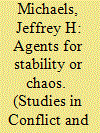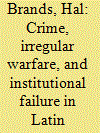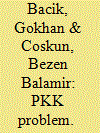| Srl | Item |
| 1 |
ID:
106607


|
|
|
|
|
| Publication |
2011.
|
| Summary/Abstract |
Recent discussions among U.S. officials about how the intelligence community can demonstrate its "relevance" to counterinsurgency have been dominated by an ideology that presupposes large-scale military intervention, and in which the role of intelligence is limited to improving analysis in support of current military activities, with little debate of future requirements. This article will highlight a number of alternative conceptions of intelligence "relevance" to counterinsurgency, based on a study of several historical and contemporary U.S. and non-U.S. cases, and by applying a wider definition of counterinsurgency that includes cases where the military plays a subordinate role relative to the intelligence services.
|
|
|
|
|
|
|
|
|
|
|
|
|
|
|
|
| 2 |
ID:
106604


|
|
|
|
|
| Publication |
2011.
|
| Summary/Abstract |
This article sheds light on the identity and activities of foreign fighters who were active in Afghanistan and Pakistan between 2002 and 2006. This is done through analyzing a series of "martyr biographies"-short biographical stories of killed militants-issued by the Al Qaeda network in 2008. The study argues that there was little migration of foreign fighters from abroad to Afghanistan and Pakistan in this period, and practically no influx of fighters from Iraq. Al Qaeda's activities in the region were upheld by fighters who managed to flee from Afghanistan during and after the U.S.-led invasion in late 2001. After re-settling in the tribal areas of Pakistan, the main concern for these fighters was to fight a guerrilla war against U.S. and NATO troops in Afghanistan, not to plot terrorist attacks in Western countries. The study demonstrates that over time, the foreign fighters became more integrated in local communities. These early developments may help to explain why Al Qaeda continues to enjoy a strong sanctuary in the tribal areas of Pakistan today.
|
|
|
|
|
|
|
|
|
|
|
|
|
|
|
|
| 3 |
ID:
106609


|
|
|
|
|
| Publication |
2011.
|
| Summary/Abstract |
This article examines the current crisis in Guatemala as a case study in the phenomenon of "criminal insurgency" in Latin America. Since the close of Guatemala's civil war in 1996, crime-especially violent crime-has increased dramatically, to the point that drug traffickers, organized crime syndicates, and youth gangs are effectively waging a form of irregular warfare against the state. The police, the judiciary, and entire local and departmental governments are rife with criminal infiltrators; murder statistics have surpassed civil-war levels in recent years; criminal operatives assassinate government officials and troublesome members of the political class; and chunks of territory are now effectively under the control of criminal groups. All this has led to growing civic disillusion and eroded the authority and legitimacy of the government. Rampant crime is causing a crisis of the democratic state.
|
|
|
|
|
|
|
|
|
|
|
|
|
|
|
|
| 4 |
ID:
106606


|
|
|
|
|
| Publication |
2011.
|
| Summary/Abstract |
In the pages of this journal in 2005, the author argued that the dismantling of the Revolutionary Organization 17N did not equate to the final elimination of terrorism in Greece. European experience, it was further argued, had shown that when a major terrorist organization is broken up, after a period of time a new generation of terrorists emerges that tends to lack the operational capabilities and scope of the group they attempt to imitate, but this does not render them less dangerous. Tellingly, the Revolutionary Struggle (RS) picked up the baton of violence from 17N before the latter's trial had even come to an end. This article examines RS's campaign of violence, explains its selection of targets and compares the group's ideological physiognomy and operational development with that of the group it aspired to emulate.
|
|
|
|
|
|
|
|
|
|
|
|
|
|
|
|
| 5 |
ID:
106610


|
|
|
|
|
| Publication |
2011.
|
| Summary/Abstract |
This article discusses why Turkey has failed to propose an effective political solution of the Kurdish problem. It is argued that Turkey's failure to propose an effective political agenda is the main explanation of why Partiya Karkeran Kurdistan (PKK) insurgency has been rampant for so long. Turkey's commitment to militaristic methods worsened the Kurdish problem by creating deeper social problems. Furthermore, it is argued that the explanations tendered also point out the important factors that may affect the fate of any political agenda on the Kurdish problem, including that of the recent Kurdish initiative of the Justice and Development Party (AKP) government.
|
|
|
|
|
|
|
|
|
|
|
|
|
|
|
|